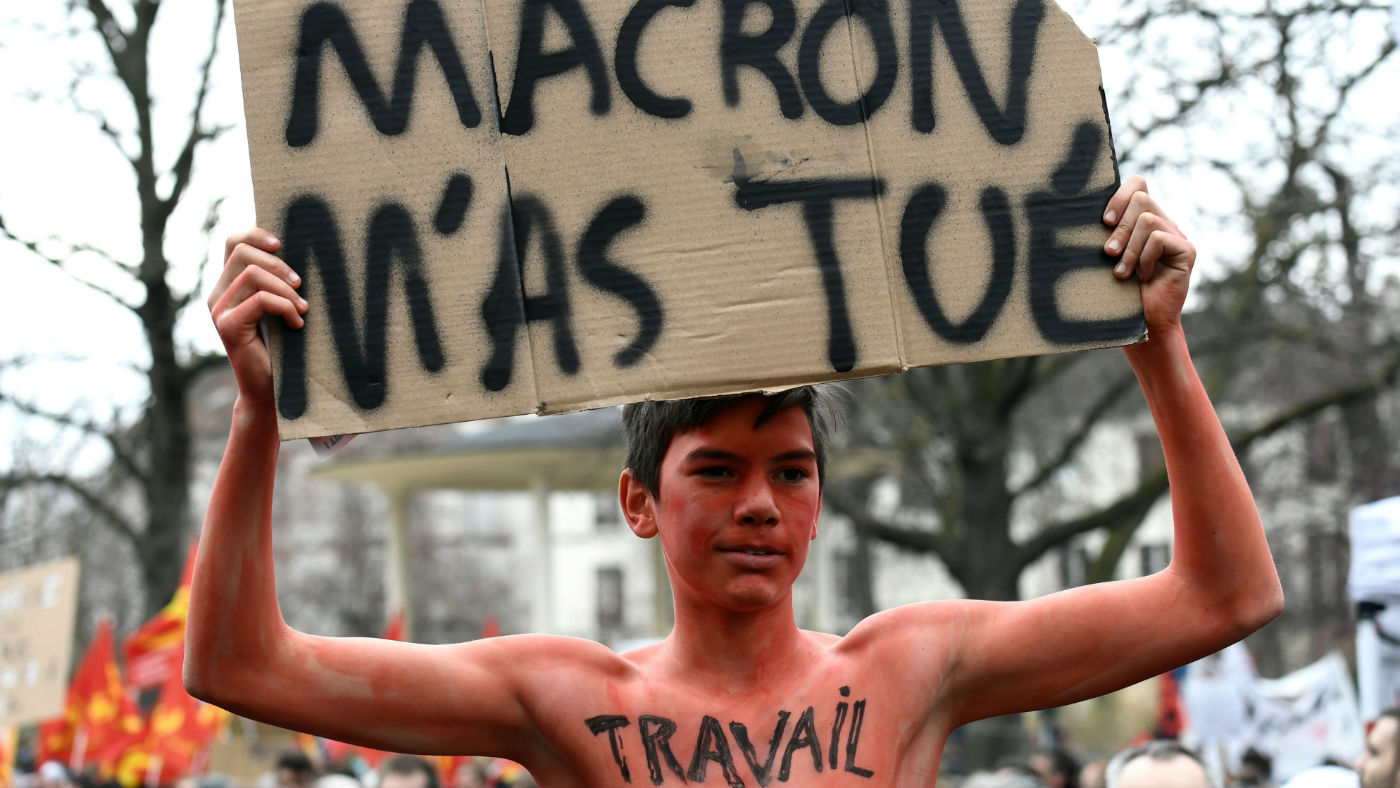Nationwide strikes bring France to standstill
Police fire teargas as protesters challenge Macron’s economic reforms

A free daily email with the biggest news stories of the day – and the best features from TheWeek.com
You are now subscribed
Your newsletter sign-up was successful
Thousands of French public sector workers took to the streets yesterday as part of a nationwide strike in protest at Emmanuel Macron’s planned public sector reforms.
Train drivers, teachers, nurses and air traffic controllers held more than 150 marches in towns and cities across France. Most were peaceful, although there were reports of police scuffling with protesters in Paris and firing tear gas and water cannon at demonstrators in the western city of Nantes.
The walk-out meant 60% of fast trains, 75% of intercity trains and 30% of flights to and from Paris airports had to be cancelled. Around 13% of teachers walked off the job, forcing the closure of a large number of primary schools.
The Week
Escape your echo chamber. Get the facts behind the news, plus analysis from multiple perspectives.

Sign up for The Week's Free Newsletters
From our morning news briefing to a weekly Good News Newsletter, get the best of The Week delivered directly to your inbox.
From our morning news briefing to a weekly Good News Newsletter, get the best of The Week delivered directly to your inbox.
There are two different sets of grievances behind the strike day, “both of which have the potential to cause a headache for the French government”, says The Guardian.
France’s 5.4 million state workers are angry over plans to cut the public sector by 120,000 workers by 2022, with unions accusing Macron of seeking to dismantle the state sector, and about the introduction of merit-based pay.
The coordinated day of action is the first widespread strike seen in France since President Macron came to power just under a year ago, on a promise to reform the country’s bloated public sector and shake up its antiquated labour laws.
However, “opinion polls show a paradox” says Reuters: a majority of voters back the strike but an even bigger majority back the reforms, including cutting the number of public sector workers and introducing merit-based pay.
A free daily email with the biggest news stories of the day – and the best features from TheWeek.com
“That has led the government, which overhauled labour laws last year and is crafting a series of other reforms to unemployment insurance and training, to say it will stand by its plans, while keeping a close eye on protests,” reports the news agency.
The danger, says CNN, “will come in the longer term if unions are able to persuade their members to stay home for longer, which could lead to wider economic repercussions”.
-
 Political cartoons for February 14
Political cartoons for February 14Cartoons Saturday's political cartoons include a Valentine's grift, Hillary on the hook, and more
-
 Tourangelle-style pork with prunes recipe
Tourangelle-style pork with prunes recipeThe Week Recommends This traditional, rustic dish is a French classic
-
 The Epstein files: glimpses of a deeply disturbing world
The Epstein files: glimpses of a deeply disturbing worldIn the Spotlight Trove of released documents paint a picture of depravity and privilege in which men hold the cards, and women are powerless or peripheral
-
 Greenland’s capital becomes ground zero for the country’s diplomatic straits
Greenland’s capital becomes ground zero for the country’s diplomatic straitsIN THE SPOTLIGHT A flurry of new consular activity in Nuuk shows how important Greenland has become to Europeans’ anxiety about American imperialism
-
 Epstein files topple law CEO, roil UK government
Epstein files topple law CEO, roil UK governmentSpeed Read Peter Mandelson, Britain’s former ambassador to the US, is caught up in the scandal
-
 Iran and US prepare to meet after skirmishes
Iran and US prepare to meet after skirmishesSpeed Read The incident comes amid heightened tensions in the Middle East
-
 Israel retrieves final hostage’s body from Gaza
Israel retrieves final hostage’s body from GazaSpeed Read The 24-year-old police officer was killed during the initial Hamas attack
-
 China’s Xi targets top general in growing purge
China’s Xi targets top general in growing purgeSpeed Read Zhang Youxia is being investigated over ‘grave violations’ of the law
-
 Panama and Canada are negotiating over a crucial copper mine
Panama and Canada are negotiating over a crucial copper mineIn the Spotlight Panama is set to make a final decision on the mine this summer
-
 Why Greenland’s natural resources are nearly impossible to mine
Why Greenland’s natural resources are nearly impossible to mineThe Explainer The country’s natural landscape makes the task extremely difficult
-
 Iran cuts internet as protests escalate
Iran cuts internet as protests escalateSpeed Reada Government buildings across the country have been set on fire